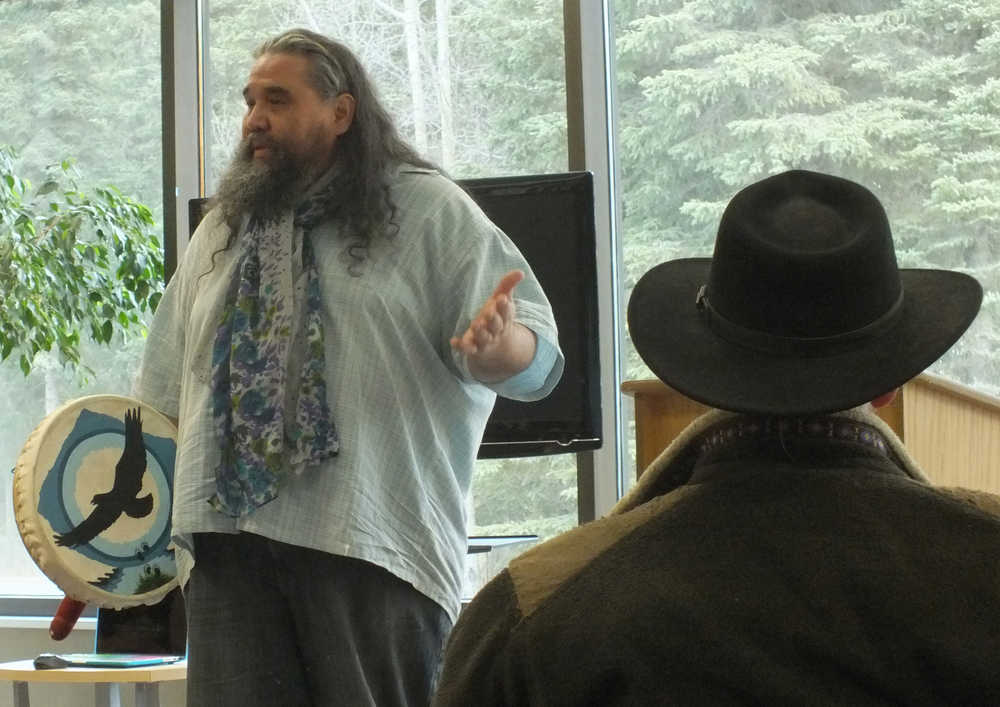The nine speakers from the Alaskan Native community who presented at Friday’s Alaska Native Oratory event at Kenai Peninsula College, Kenai River Campus, offered their listeners humor, music, opinion, and stories of personal and social resilience.
“What you have to say is important,” said Master of Ceremonies Jack Dalton, encouraging reluctant speakers to come forward from the audience and at the same time offering a summary of the program’s philosophy. “What you have to say is valid. What you have to say, as a Native person, deserves to be heard.”
The event, held in KPC’s McLane Commons, was the seventh annual speaking session to be hosted on the Kenai Peninsula under the wing of the state-wide Alaska Native Oratory Society, which will hold a similar statewide gathering in Anchorage on April 11.
Organizer Diane Taylor of the KPC Learning center said that during its long history, the Native Oratory event has departed from its origins as a state and regional competition.
“We had judges, and people could practice for the first round and then they were judged on the second, like a forensics or a debate,” Taylor said of the early oratory gatherings.
“That’s what the founders of this whole thing wanted. They wanted our young Native people to feel comfortable speaking, speaking for their rights and for issues that are important to all people. So it was a way to try to mentor that and give them some solid feed-back. So I’ve gone from having a panel of judges to now, it’s really more a celebration.”
Rather than a competition, the speaking event on Friday followed the format of an open-mic reading, in which participants were able to register beforehand and members of the audience could add themselves to the list of speakers.
Each was allowed five minutes to give presentations under one of six categories: storytelling, native-language speaking, humor, poetry or rap, new media, or real-life stories.
Dalton said that the stories told at the event represented both a continuation and an adaptation of Alaskan Native culture.
“Our people used to be great orators,” Dalton said. In an interview after the event, he said that the tradition of native oratory grew from debates and speeches at village meetings.
“It was known that the greatest leaders were the ones who really knew how to speak well,” Dalton said.
That lively oratorical tradition was continued by several of the event’s speakers. Marvin Kiokun performed a pair of one-man skits featuring a robber who steals grades from students and a hunter who makes the mistake of abandoning his kayak. George Holly told about his composition of “Kahtna Tuygea,” a Dena’ina-language song that uses the lifecycle of Kenai River salmon as a metaphor for graduating students. Bunny Swan-Gease performed another song, and later a hand-puppet rendition of the traditional story of a raven’s attempt to migrate with a flock of geese.
However, Dalton spoke of a different tradition, what he called “the tradition of not talking about bad things.” Dalton said this tradition was once a cultural benefit.
“If you focus too much on bad things, you’re not doing the work you’re meant to be doing to survive,” Dalton said. “So not talking about bad things kept us alive for thousands of years.”
Dalton said this is no longer true in Native societies.
“The turmoil we’ve been experiencing in the past 150 years is so tremendous that the tradition of not talking about bad things — what saved us for so long — is what’s killing us now,” Dalton said.
In this respect, the often harsh autobiographical stories that other presenters told on Friday reflected a change. Phillip Kopanuk gave an account of how Christianity helped him overcome an addiction to alcohol and drugs.
Deborah Wagoner spoke of her daughter’s death in the military. KPC student Zoia Kernak told how speaking about sexual abuse had made her unwelcome in her community of Calista. Deborah Walunga, originally from Gambell and currently a student at Alaska Christian college, said that a lack of open discussion was hurting her hometown.
“Because of all that I went through, at one point I hated my village,” Walunga said. “After going to… high school and being away from it for so long, I started falling in love with it again. I kind of realized that the reason my people are hurting is because we don’t know how to communicate. We’ve been through a lot that we guard in our own hearts.”
Reach Ben Boettger at ben.boettger@peninsulaclarion.com

